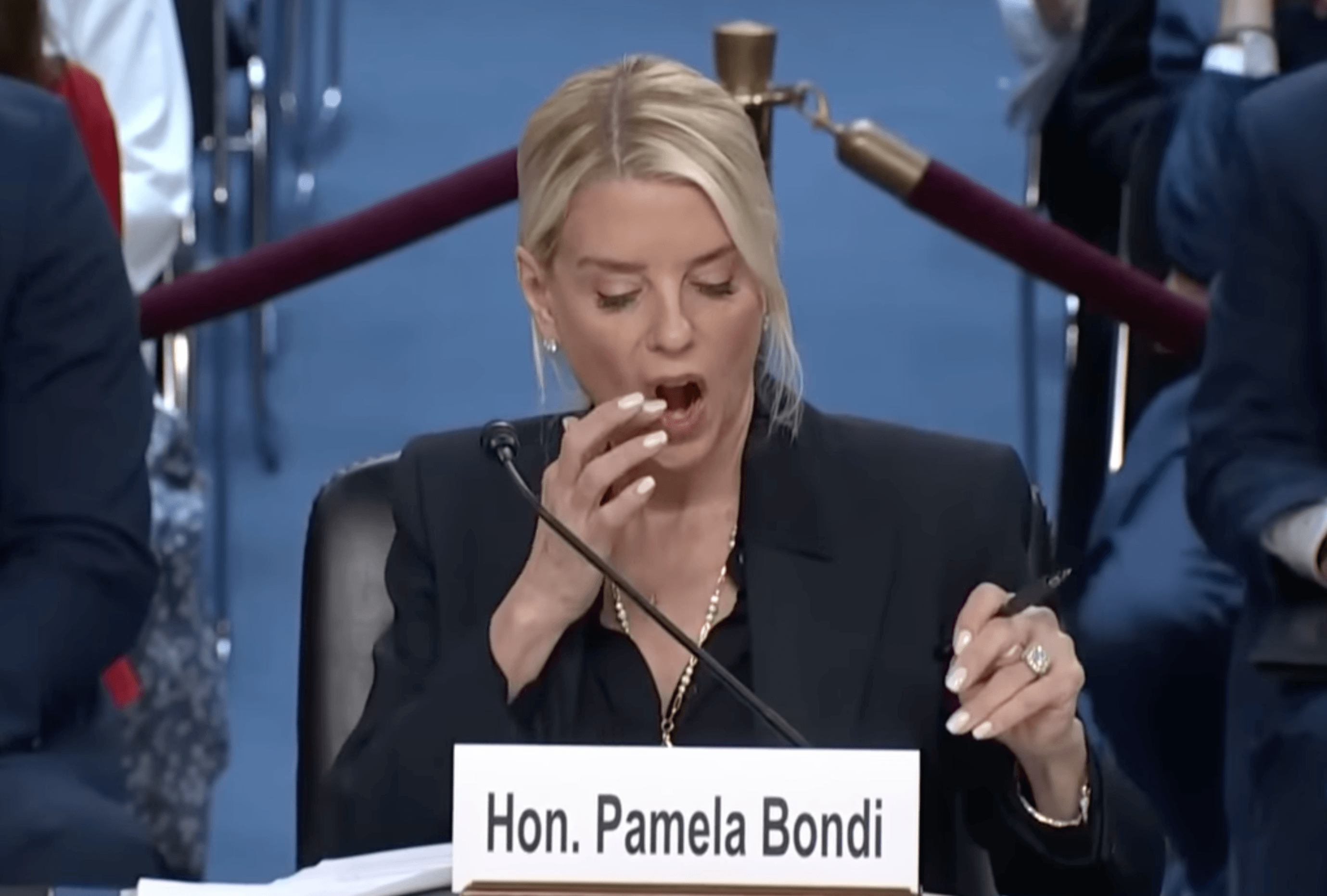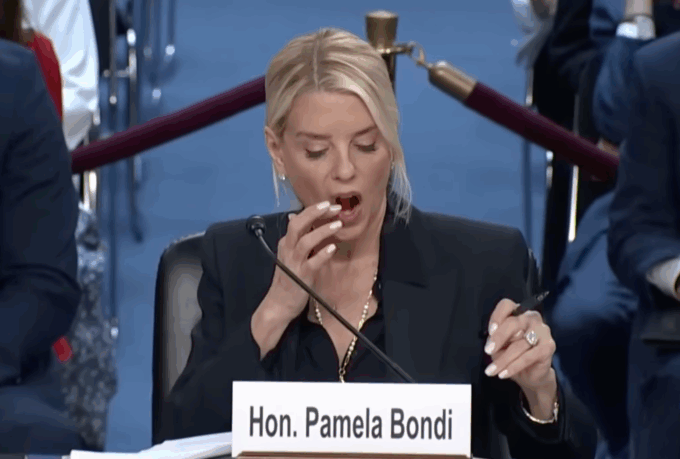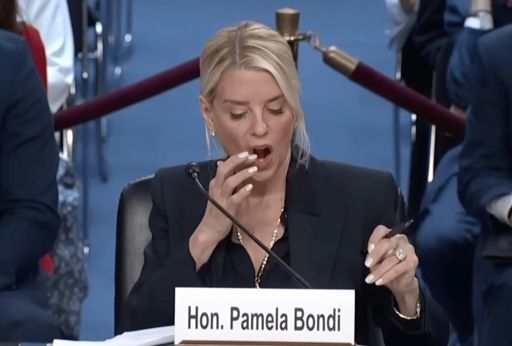

Screengrab from C-Span coverage of Pam Bondi’s testimony before the Senate.
On October 7, Attorney General Pam Bondi appeared before the Senate Judiciary Committee. What should have been a routine hearing descended into a theatrical display of personal attacks, interruptions, and challenges to the senators’ authority. What was meant to be mere “testifying” by a Cabinet member turned into a dramatic performance. Bondi’s conduct was more than uncivil; it was another example of the fragility of American democracy and the transformation of the meaning of politics. At a time when theater and culture often overshadow governance, her “testimony” offers a striking example of how politics, like democracy, is under siege.
“This is supposed to be an oversight hearing where members of Congress can get serious answers to serious questions, about the cover-up of corruption, about the prosecution of the president’s enemies,” California Senator Adam Schiff told the committee. Schiff was emphasizing the committee’s power to request members of the president’s Cabinet to appear and to expect them to answer respectfully. “When will it be that the members of this committee, on a bipartisan basis, demand answers to those questions?” Schiff demanded of his colleagues as Bondi tried to interrupt.
“I think you owe the president an apology for your entire career,” Bondi retorted, never directly responding. In that moment, she inverted the tone of the power relationship between members of the Senate committee and her role as an unelected member of the Cabinet.
Similarly, when Senator Dick Durbin asked if she was consulted about the deployment of National Guard troops to Illinois, she responded, “If you’re not going to protect your citizens, President Trump will.” Once again, she refused to answer the question and responded with a vindictive personal attack.
“I’ve been on this committee for more than 20 years and that’s the kind of testimony you expect from this administration,” Durbin summarized. There was no serious interaction between Bondi and the Democratic senators, only a series of insults divorced from the questions posed.
When Bondi strutted off, she was visibly pleased with her performance and seemingly assured of a positive feedback from her mentor, the Actor-in-Chief. (How else to understand Trump’s negative reaction to the Time magazine cover photo? He places more attention on his image than on the hard work of creating a lasting peace in the Middle East.)
Beyond these confrontations, Bondi’s hearing raises the broader question: Does this type of theater exemplify the end of politics?
In one of his typical contrarian pieces on “Progress and Its Vicissitudes,” the Slovenian philosopher and culture critic Slavoj Žižek quotes the German philosopher Walter Benjamin on post-politics:
“The retreat from more substantive visions of justice heralded by the promulgation of tolerance today is part of a more general depoliticization of citizenship and power and retreat from political life itself.”
Žižek’s point, and his use of Benjamin, is that since the 1960s there has been a shift “away from economic and political freedom to cultural freedom.” He asks: “Why…have so many problems come to be perceived as problems of intolerance, not as problems of inequality, exploitation, injustice? Why is the proposed remedy tolerance, not emancipation, political struggle…? Using Benjamin’s terms, Žižek writes of the shift from the “culturalization of politics” to the “politicization of culture.”
Culturalization neutralizes political differences. Different ‘ways of life,’ are treated as something fixed, given, and unchangeable, something that cannot be overcome. Differences are “tolerated” but not debated or resolved. Some U.S. college campuses, for example, focus on banning microaggressions, prioritizing tolerance over substantive political engagement. Yet Oxford Union debates, dating to 1823, or heckling in the House of Commons have not brought down the United Kingdom. Serious political debates and policy confrontations may be microaggressions, but they are the heart of political engagement.
Bondi’s “testimony” exemplified the shift from substantive political debate to culturalized spectacle. Critics, as I noted above, focused on her refusal to answer questions directly as well as her lack of civility. In that sense, Bondi’s personal comments were merely part of the ongoing culture war. To focus solely on Bondi’s unwillingness to answer the questions overemphasizes tolerance rather than politics.
For example, the politicization of the Department of Justice (DOJ) could have been a major topic of questioning during the hearing. Senator Alex Padilla of California did say that under Bondi’s leadership, “The department has been reorganized, it’s been realigned and repurposed in ways that we’ve never seen before…And together these steps send a dangerous message that prosecutorial decisions can be driven by political loyalty instead of the law.”
The politicization of the DOJ is deeply relevant, but it avoids the overriding issue of the Trump administration’s efforts to limit freedom of speech. Bondi defended her department’s prosecution of hate speech as criminal, then clarified that it only applied when such speech incited violence. Still, more was needed. Justice Sotomayor, in an indirect response to Bondi’s position, pointed to the dangers of limiting First Amendment rights: “Every time I listen to a lawyer-trained representative saying we should criminalize free speech in some way, I think to myself, that law school failed.”
A genuine political debate could also have addressed the lack of decent legal representation for the working poor, as eloquently described in Brian Goldstone’s There is No Place for Us: Working and Homeless in America. That would be part of politics. Alongside free speech, the right to proper representation for all Americans deserved serious discussion.
Bondi’s hearing was not just a failure of civility; it was a symptom of post-politics, a place where personal attacks replace serious debate. Today, much too often, culture trumps politics, and the erosion of democracy accelerates with the erosion of its political foundations.
Democratic life thrives on conflict, not choreography; on genuine disagreement, not applause or crowd-pleasing performances; on serious debate, not fearful silences. When the theater replaces the forum, when the audience replaces the citizen, when the Agora is replaced by TikTok and X, democracy becomes a perpetual rerun of The Apprentice. Bondi’s October 7 performance did more than just confirm the demise of democracy in the United States; it showed the more general collapse of its political life.
The post Pam Bondi Before the Senate: When Politics Becomes Theater appeared first on CounterPunch.org.
From CounterPunch.org via this RSS feed


